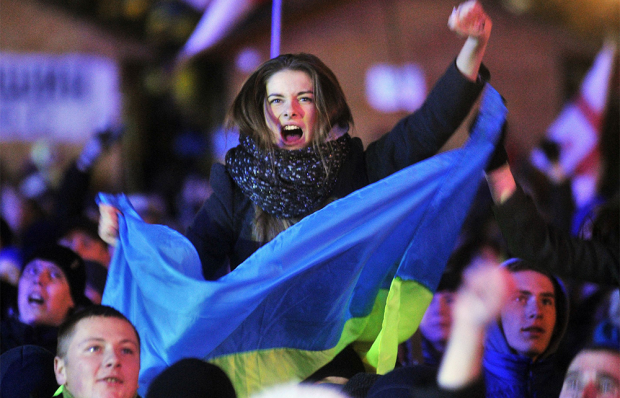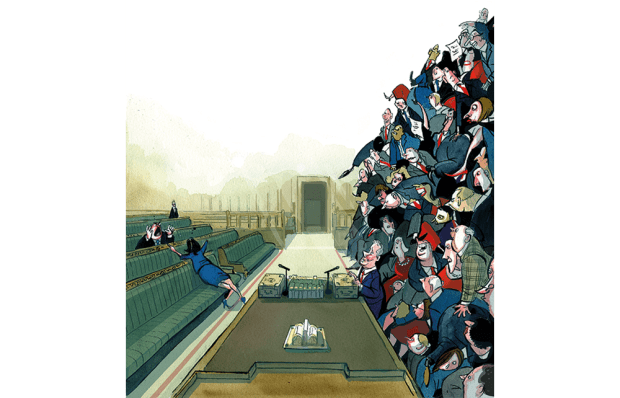Out of Afghanistan
Sir: Boyd Tonkin’s review of Anna Aslanyan’s Dancing on Ropes highlights the post-war abandonment of local Afghan and Iraqi interpreters by the US and UK (Books, 17 July). The UK’s response, up until last summer, deserved every bit of Tonkin’s strictures but the past year has seen a ‘strategic shift’. Ben Wallace and Priti Patel were clearly determined to change our approach and to give sanctuary to our former staff. More generous regulations were introduced in December and April but the imminent withdrawal of Nato forces now raises the fearful prospect of a Taleban takeover, or Taleban-induced paralysis of the Afghan government, before the necessary evacuation can take place.
There is still a window of maybe two to three months in which to act but we will be pushed to succeed: more resources are required, still greater flexibility is essential to remove remaining excluded categories, and there needs to be a robust ‘what if’ plan. The US has already started to plan
an evacuation of the 18,000 Afghans who are potentially eligible for the US scheme to a third country for processing; we need to be prepared to do the same.
Genuine credit is due to this government for finally grasping the nettle but ‘too little too late’ may still be how it is judged unless we can match the demand at the pace required. As for President Joe Biden, whose rapid withdrawal has caused this immediate crisis, I fear ‘Afghanistan’ will be found engraved on his heart, as ‘Calais’ was on Queen Mary I’s.
Simon Diggins OBE, Colonel (Retired)
Rickmansworth
Platonic relationship
Sir: Adrian Wooldridge’s article on Benjamin Jowett (‘Rhodes to redemption’, 17 July) is interesting on his possible intersexuality but fails to mention one of the achievements for which he is best remembered: his translation of Plato.
At a time when ‘Greek love’ was frowned upon (Jowett himself expelled a student who sent some homosexual sonnets to Walter Pater), Jowett’s influential rendition of all the dialogues, which remained a standard work for a century, helped to re-orientate the cultural consensus.
Graham Chainey
Brighton
Must try harder
Sir: I was a few years behind Charles Moore at school but many light years behind him academically. We might not have shared the same grades but Charles and I did share similarly deflating and insulting tutors’ comments (The Spectator’s Notes, 17 July) — few of which, as he points out, would be written today. My favourite from my A-level year came from the inimitable Bill Winter: ‘Ray, you are fat and idle and drink too much. Have you even read the wretched texts? You show the grasp and clarity of a senile sheep and I’m confident in saying there is absolutely no hope for you at all.’ Ouch.
Jonathan Ray
Brighton
Royal treatment
Sir: Nicholas Coleridge’s Diary (17 July) regarding planning for the Queen’s Platinum Jubilee pageant is both timely and depressing. I am old enough, and was fortunate enough, to witness Her Majesty’s coronation procession from a flat in Park Lane. The owner of the apartment, a former Polish refugee and, by then, successful couturier, invited my mother, brother and me to watch from her balcony. She also contacted a Dr Barnardo’s home to invite a further 25 children. How many today in a similarly privileged position are likely to emulate this generous gesture?
Peyton Skipwith
London NW3
Cracking China
Sir: Tom Miller’s review of my book The Perfect Police State, about China’s genocide against the Uighur minority group, was poignant, well-written and on point (Books, 17 July). But Mr Miller errs when he claims that I have ‘little China experience, and it shows’. I have been a student of Mandarin Chinese, and of China’s vast, engrossing history, literature, film and politics, since 2004, when I was an undergraduate. I continued my studies at SOAS, where I focused on China’s relations with south-east Asia, and received a master’s degree with distinction. Since then, I’ve been to almost every Chinese province. From 2008 to 2013, I had an apartment in Beijing, and in 2009 I began writing about China for the Far Eastern Economic Review.
As a World Health Organisation consultant in China in 2014, I had a front-row seat for some of the bungled organisational politics that later culminated in the poor handling of China’s Covid-19 pandemic. And from 2018 to 2021, I lived among Uighur refugees in Turkey.
Mr Miller appears to mistake a thesis that differs from his own as the sign of an inexperienced writer. China may be seen by the West as monochrome, but it holds a diversity of peoples, dialects, regions and histories. With diversity and complexity comes a huge number of facts, stories and narratives that will not always fit into one way of analysing the country.
Geoffrey Cain
Washington, DC
The joy of Jeremy
Sir: Jeremy Clarke is the reason that I start reading your newspaper a handful of pages in from the back. I have recently conducted a survey of a small number of other readers; I found that they all do the same. I know I am extrapolating from a small sample, but I suspect that a large number of readers do likewise. I understand that Mr Clarke is unwell. I thought you might like to pass on one other finding from this survey: we all agree that Mr Clarke is one of the very best writers of the English language in any form at work today. I again suspect that a large number of your readers feel the same.
Charlie Newington-Bridges
Wolvesnewton, Monmouthshire
Got something to add? Join the discussion and comment below.
Get 10 issues for just $10
Subscribe to The Spectator Australia today for the next 10 magazine issues, plus full online access, for just $10.
You might disagree with half of it, but you’ll enjoy reading all of it. Try your first month for free, then just $2 a week for the remainder of your first year.














Comments
Don't miss out
Join the conversation with other Spectator Australia readers. Subscribe to leave a comment.
SUBSCRIBEAlready a subscriber? Log in